Building the Case Against Evil
McGill law students are helping international courts bring war criminals to justice.

The Genocide Memorial at Murambi, Rwanda
Kirk Shannon
BY JONATHAN MONTPETIT, BA’03
It’s certainly not unusual to find weary-looking law students poring through books in the Nahum Gelber Law Library on a weeknight, but they might not be pondering property law or considering contracts. There is a good chance that they’re actually busy thinking about the very worst things that people do to one another in this world, and how they can use the law to address those atrocities.
There is an international effort currently under way to construct a legal system for the pursuit and punishment of some of the world’s most notorious human rights abusers and, thanks to some unique programs in the Faculty of Law, McGill students are finding themselves in the thick of the action.
Aside from the tribunals that followed the Second World War, the trying of international crimes against humanity is largely a phenomenon of recent years.
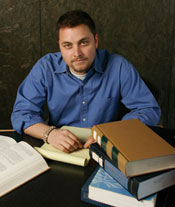
Fourth-year law student Kirk Shannon
Allen Mcinnis
Since its inception in 2002, the International Criminal Court has, for example, issued arrest warrants for members of the Lord’s Resistance Army, a paramilitary group believed responsible for mutilating, raping and killing civilians in northern Uganda, and collared Thomas Lubanga, accused of conscripting child soldiers for his Union of Congolese Patriots.
Such legal efforts are raising the global profile of human rights violations, ensuring that massacres resonate with the public consciousness as more than simply a strange name. Indeed, far-off places – Kigali, Srebrenica, Freetown – are now quick to become bywords for injustice as guilty persons are made to pay for their terrible deeds.
UNCHARTED TERRITORY
But the rise of international criminal law has been as complex as it has been swift: the quest for a global brand of justice has few legal precedents. “There is no body of international law out there that is ready-made,” says René Provost, director of McGill’s new Centre for Human Rights and Legal Pluralism. “Judges have had to make it up.”
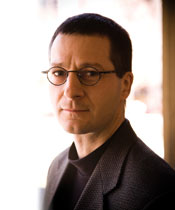
René Provost, director of McGill's Centre for Human Rights and Legal Pluralism
Claudio Calligaris
As the world moves to enshrine human rights, the traditional legal approaches to international problems are proving inadequate. The CHRLP has followed suit; the research centre fosters a multi-disciplinary outlook that emphasizes student involvement through an array of internship programs – all in the hopes, Provost explains, of encouraging “a broader understanding of the law. We’re trying to abandon an overly state- centered approach to human rights.”
Initiated in 2003, the CHRLP draws on McGill’s strengths in two different fields: human rights and the study of comparative law.
The Faculty of Law’s reputation as a leader in civil liberties stretches back several generations, beginning with John Humphrey, BCom’25, BA’27, BCL’29, PhD’45, LLD’76, who wrote the first draft of the United Nations’ Universal Declaration of Human Rights, and constitutional expert F.R. Scott, BCL’27, LLD’67, who famously tussled with autocratic Quebec premier Maurice Duplessis over the latter’s treatment of Jehovah’s Witnesses — and carrying on through to Paul-André Crépeau, a key player in the reform of Quebec’s Charter of Human Rights and Freedoms, and former Attorney General of Canada Irwin Cotler, BA’61, BCL’64.
McGill is also the only school in North America to offer in-depth training in both common and civil law — it’s a distinct advantage for students interested in international human rights because, in an effort to avoid too close a link with any one country’s legal system, tribunals are creating international criminal law as a composite of representative legal systems.
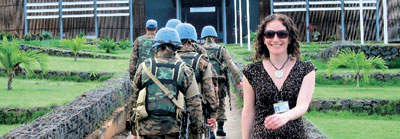
Recent law graduate Anna Matas works in Freeport for the Special Court for Sierra Leone. In the photo above, she shares a walkway near the court with Mongolian peacekeepers.
Anna Matas
“Tribunals must navigate among various systems and traditions,” explains Provost, “which is exactly the way that McGill law students are taught — unlike students in every other law school in Canada.”
HUMAN RIGHTS A DRAWING CARD
McGill is a premier destination for students eyeing careers defending human rights on the international stage. “Three-fourths of the applications we get speak to something related to human rights as justification for wanting to study at McGill,” Provost says.
Founded, in part, as a response to students’ growing interest in human rights, the CHRLP offers internships, clerkships and work opportunities that give students a chance to apply their book smarts to actual cases of international justice.
The CHRLP’s International Human Rights Intern-ships Program pairs students with non-governmental partner organizations, where they gain 12 weeks of practical work experience in human rights investigation, monitoring and reporting. McGill students have traveled to Cairo to help refugee claimants prepare testimonies for the United Nations High Commissioner for Refugees, and have done first-hand research on the conditions of Cambodian prisons. They’ve investigated Pakistan’s juvenile justice system, and have worked with Human Rights Watch in New York to monitor Saddam Hussein’s trial.
TRAUMATIC TALES
But perhaps the most sought-after CHRLP internship program is the Special Court for Sierra Leone Legal Clinic.
In 2004, the CHRLP joined the “International Criminal Court and Accountability Campaign,” an initiative of Foreign Affairs and International Trade Canada that aims to promote the effective operation of the ICC and other international criminal tribunals.
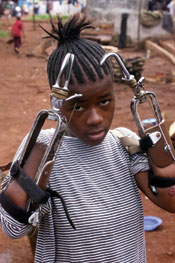
A 14 year-old victim of the political violence in Sierra Leone
Adam Butler/AP Photo
As a result, the McGill centre provides legal research to judges trying cases of suspected human rights violations during Sierra Leone’s decade-long civil war. Though 7,000 kilometres separates the University’s “remote” clinic and the court in Freetown, Sierra Leone, the two work closely to pursue justice in cases ranging from voter intimidation (by hacking off people’s hands) to the conscription of child soldiers.
“One of the dangers of working from afar on a war crimes trial is becoming too detached,” explains Benjamin Perrin,LLM’07, who served as the clinic’s assistant director in 2005-06. To prevent emotional disconnect, clinic students watched footage of the armed conflict in Sierra Leone. “It was extremely graphic, to say the least,” Perrin recalls, “the kinds of images that stay with you forever. It left us motivated to do the very best job we could to help the Special Court in its mission of bringing those most responsible to justice.”
The Special Court, established by the government of Sierra Leone and the United Nations in 2002, requests legal advice from a team of McGill law students, who answer questions of substance (what type of intent is required for a particular kind of crime?), evidence (should hearsay evidence be admitted?) and procedure (under what conditions can the defence or the prosecution access witnesses?).
The students are on standby, ready to respond with sometimes as little as 24 hours notice. “We spent many nights in the library with energy drinks and pizza,” says Perrin in a phone interview from his current office at the Supreme Court of Canada, where he is a law clerk. McGill’s resources, which include the Nahum Gelber Law Library — arguably the best collection of international criminal law writings in the country — have proved invaluable. “We were able to offer the special court research across several languages and legal systems. They really are on a shoestring budget and have to rely on the legal clinic.”
While the clinic is based in Montreal, McGill students have had the chance to work directly for the court in Freetown. Anna Matas, BCL/LLB’06, a recent graduate and clinic employee, now finds herself working as the special court’s associate legal officer. Her work involves evaluating evidence presented before the court and researching various legal issues for the judges. She acknowledges that her time at the McGill clinic prepared her well to make the jump into the highly competitive field of international criminal law.
“It provided an opportunity for me to deepen my knowledge of the area in which I am now working,” she says. “It was also great to have the chance to do something that is both academic and practical.”
REAL-WORLD RAMIFICATIONS
Creating that intersection between academia and the real world — what Provost calls “a very important moment in a student’s life” — is an essential element of what the CHRLP offers. Given that law school itself can be an intense experience, it is easy for students to lose perspective about the implications of their studies. “The critical thing is that there’s an accused in jail whose life may be affected by what they write here,” Provost says. “It’s the reality of the lawyer’s life.”
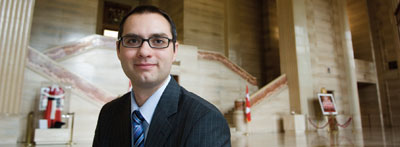
Benjamin Perrin, a former assistant director of McGill's Sierra Leone clinic, at the Supreme Court of Canada where he has been working as a law clerk
Colin Rowe
Current students in the faculty readily agree about the value of such an approach. Offering a range of international internships is the perfect complement to classroom education, suggests fourth-year law student Kirk Shannon. As part of the centre’s Human Rights Internship program, Shannon spent last summer working for the International Criminal Tribunal for Rwanda. Located in Arusha, Tanzania, the tribunal prosecutes people — many of whom are former high-ranking government officials — accused of participating in the 1994 slaughter of an estimated 800,000 Rwandans. Shannon worked on the trial of Colonel Théoneste Bagosora, said to be one of the primary masterminds of the genocide, researching the numerous procedural and evidentiary motions filed by the prosecution and the defence. He also condensed hundreds of pages of witness testimonies into succinct summaries. “That half of my job,” he recalls, “was gut-wrenching. It was horrific story after horrific story.” He says his internship was “a constant wake-up call” that a lawyer’s education shouldn’t be limited to lectures. “The classroom gives you a taste, but it leaves you thinking, ‘Wait a second, I am missing the practical aspect.’ To a certain extent, the only way you can really understand is to get your fingers dirty as much as you can.”
BRIDGING DISCIPLINES
Exposing students to different influences is at the core of the centre’s philosophy. Through workshops and conferences, students are exposed to CHRLP members’ multi-disciplinary research, helping them to think about law in non-traditional ways; the centre encourages students to explore the causes behind certain legal problems, rather than simply focusing on possible solutions. “The law faculty has tended to be somewhat isolated within the University,” Provost acknowledges. No longer. In order to properly contextualize legal questions surrounding, say, the history of the armed conflict in Sierra Leone, CHRLP researchers are able to tap the expertise of faculty in the School of Social Work, the Department of Political Science and the Faculty of Education, among others.
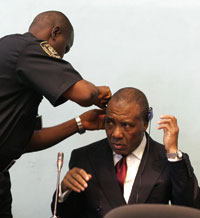
Former Liberian president Charles Taylor, charged with war crimes, appears before the Special Court for Sierra Leone
George Osodi/AP Photo
“Knowing political and historical contexts is important for several reasons,” says Perrin. “The Special Court for Sierra Leone is a hybrid war crimes tribunal, which means that it bridges domestic and international law. This meant, for example, that knowledge of the constitutional laws of Sierra Leone was important. Also, several unique crimes are being prosecuted at the Special Court, such as using child soldiers. It’s very difficult to understand such an offence without first appreciating how child soldiers have been used in various conflicts around the world — and in Africa in particular.”
By building bridges to other parts of the University, students are given perspectives that prove essential when working in a foreign country. Understanding, for example, the political or economic forces at play in any given society helps shape an approach to justice that factors in not only the demands of the international community, but local traditions as well. For its efforts, the Faculty of Law’s International Courts and Tribunal Program recently earned the Award for Excellence in Internationalization from the Association of Universities and Colleges of Canada.
Before disappearing into the stacks of the Gelber Law Library, Shannon lets slip a boyish grin. He got word the day before that he’s been selected to be a law clerk at the Supreme Court. Perrin, for his part, will soon be leaving Ottawa to join the Faculty of Law at the University of British Columbia; he was recruited as part of UBC’s effort to boost its own offerings in the human rights field. Another alumnus of the internship program, François Tanguay-Renaud, BCL’02, LLB’02, subsequently earned a Rhodes Scholarship.
MAKING A DIFFERENCE
But measuring success simply in such material terms overlooks the real reason most of these students try to forge a career in such a challenging field. “It’s not just an academic interest,” says Perrin, who has worked with victims of the Cambodia child sex trade and assisted judges at the International Criminal Tribunal for the former Yugoslavia.
“You get involved to help a country overcome a very dark period in its history. Each case has its own horrors, but I take hope in the victims who have themselves overcome these atrocities. Our conviction is that people need to be held accountable.”
Kirk Shannon agrees. During his internship in Tanzania, he took 10 days to tour Rwanda; even after hearing gruesome first-person testimonials in the courtroom, he was profoundly affected by what he saw on the streets of Murambi and Kigali. “Seeing a teenager with a deep scar — from a machete — across the side of his head, that really wakes you up,” he says. “You’re quickly reminded that although the genocide is in the past, its wounds continue to lie just beneath the surface.”


